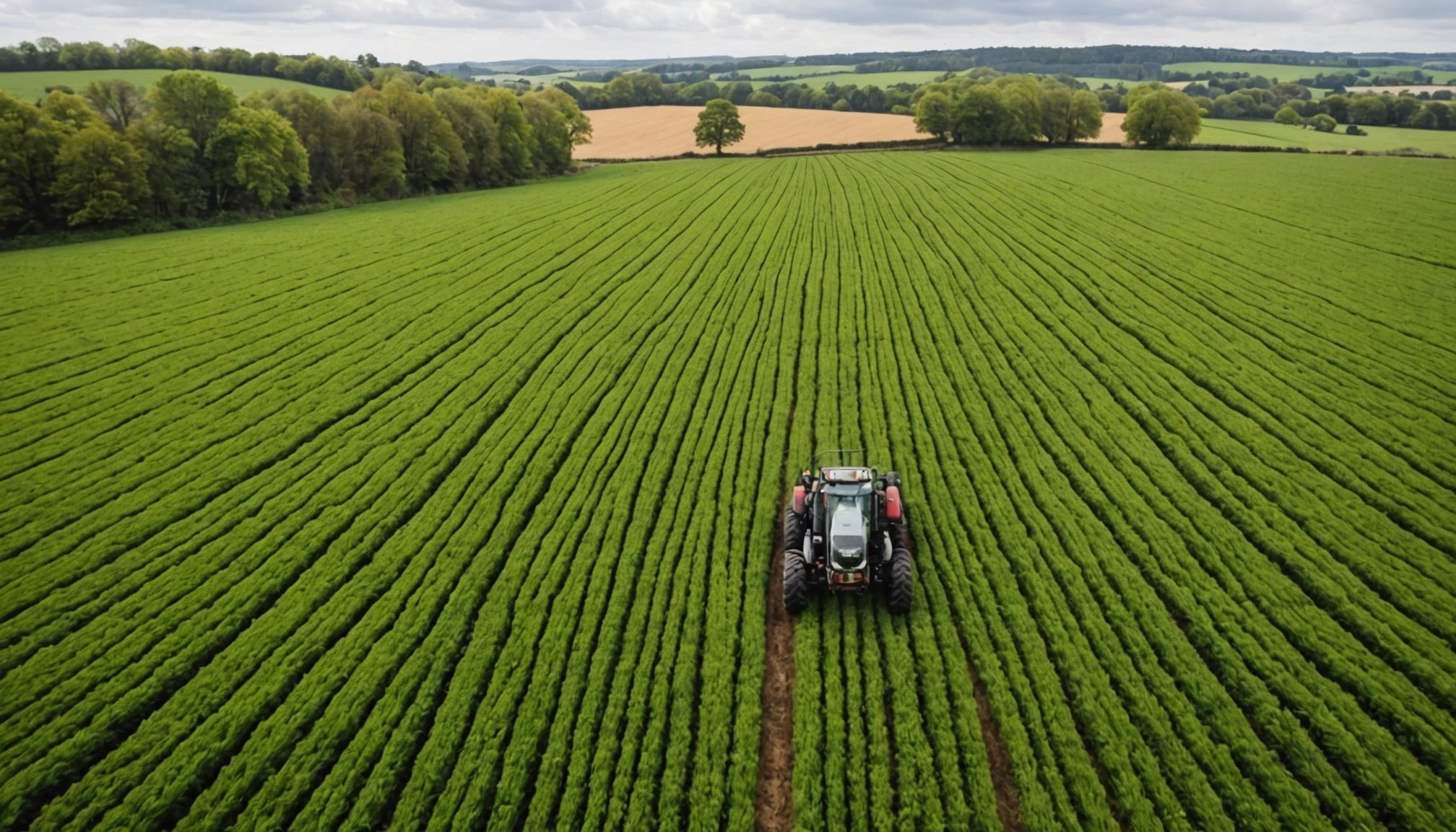Overview of AI in Precision Farming
Precision farming, powered by artificial intelligence (AI), represents a transformative approach in agriculture. This method harnesses cutting-edge technology to optimise resource management and increase crop yields efficiently. It encompasses a range of practices that use data and advanced algorithms to monitor and manage variability in fields.
AI technologies such as machine learning and data analytics play a crucial role in this evolution. By analysing vast amounts of data, AI can detect patterns and provide actionable insights, allowing farmers to make informed decisions about planting, fertilising, and watering crops. The combination of GPS technology with AI allows for precise field mapping, helping to identify variability across acres of land.
Also to read : Revolutionizing telecom customer experience in the uk: harnessing the power of ai innovations
One of the key benefits of AI in agriculture is its ability to improve overall productivity. By understanding the exact needs of crops, farmers can minimise waste, optimise irrigation, and reduce the use of fertilisers and pesticides. This leads to healthier crops and potentially higher yields. Furthermore, AI can assist in managing resources, such as water and nutrients, more efficiently—boosting the sustainability of agricultural practices. With AI, farming becomes not only more productive but also more environmentally friendly.
Case Studies of AI Applications in the UK
In the realm of UK agriculture case studies, the application of AI has led to notable advancements. One fascinating example is the development of autonomous tractors. These AI-driven machines can operate with minimal human intervention, optimising both time and resource management. By using advanced algorithms and sensors, these tractors can perform tasks such as precision planting and targeted spraying, reducing waste and increasing efficiency.
Another significant AI success story is found in soil health monitoring. Using AI technologies, farmers gain real-time insights into soil conditions. This includes moisture levels, nutrient content, and pH balance. Such data allows for timely interventions, leading to healthier crops and more sustainable farming practices. Machine learning algorithms analyse this data and provide actionable insights, ensuring optimal crop growth.
AI also plays a crucial role in pest and disease detection. Sophisticated image-recognition technologies help identify crop diseases and pest infestations early. The timely detection of these issues allows farmers to apply the right treatments at the right time, minimising crop loss. Industry experts have noted that these insights not only enhance productivity but also foster more environmentally responsible practices, contributing positively to both yield and ecosystem health.
Environmental Benefits of AI in Agriculture
AI is revolutionising agriculture by promoting sustainable farming practices. A key benefit is its ability to reduce chemical usage, which significantly impacts ecosystems. By using precise data, farmers can use pesticides and fertilisers only when necessary, decreasing harmful runoff and maintaining soil health. This precision farming technology minimises the environmental footprint of agriculture.
Another critical advantage of AI in agriculture is water conservation. AI-driven targeted irrigation systems ensure crops receive the exact amount of water needed, minimising waste. This method not only saves water but also improves crop health by preventing overwatering. Such solutions are vital in mitigating the effects of drought and supporting sustainable water management.
Furthermore, AI contributes to enhanced biodiversity through smarter land management practices. By analysing field variability, farmers can adopt diverse cropping strategies, encouraging various species to thrive. This diversity is essential for maintaining resilient ecosystems and improving soil fertility.
Through the integration of AI, agriculture becomes more environmentally friendly and resource-efficient. Farmers and industry experts acknowledge the significant positive impact of these technologies on both productivity and the health of the ecosystems they rely upon. AI’s advancement in agriculture highlights a promising future for ecological sustainability.
Challenges in Implementing AI in Precision Farming
Implementing AI in agriculture presents notable challenges that affect the adoption of precision farming technology. For many small-scale farmers, the high cost of AI technology and equipment remains a significant barrier. These expenses can limit access to advanced tools, hindering the potential benefits of precision farming.
Another pressing issue is data privacy. With AI-driven systems collecting vast amounts of data, ensuring secure and ethical handling of this information is crucial. Farmers express concerns over who owns the data and how it might be used. Establishing secure systems that provide transparency and protection against data breaches is paramount for wider AI adoption.
Additionally, there’s a considerable need for training and support among agricultural workers. The complexity of AI systems requires a workforce skilled in new technologies to fully realise their advantages. Providing adequate training resources and ongoing support is essential to bridge the skills gap, ensuring that farmers can effectively use these innovations.
With these challenges in mind, addressing financial, security, and educational obstacles is essential for the successful integration of AI in agriculture, enabling more farmers to leverage precision farming technology to its fullest potential.
Future Trends in AI and Precision Farming
Advancements in precision farming technology are paving the way for the future of agriculture, with AI innovations at the forefront. Emerging AI technologies promise to transform how we approach farming. For instance, the integration of drones with AI capabilities can provide real-time surveillance and analysis of crop health, significantly aiding in efficient farm management. Additionally, AI-powered robotic systems are being developed to automate tasks like weeding and harvesting, reducing reliance on manual labour.
Industry experts predict substantial growth in the adoption rates of AI in agriculture. These predictions stem from continuous advancements in data analytics and machine learning, which offer increasing precision and efficiency in farming operations. As these technologies become more accessible, it’s anticipated that both large-scale and small-scale farmers will begin incorporating AI-driven solutions into their practices.
Potential policy changes could also influence the future of AI in agriculture. Government initiatives promoting technological adoption and providing financial support could accelerate AI usage in precision farming. Moreover, policies focusing on sustainable practices, such as encouraging reduced chemical usage through AI technologies, can further integrate AI’s role in achieving environmental goals. These trends underscore the transformative potential and continued evolution of AI in the agricultural sector.
Sustainability and AI in UK Agriculture
AI is paving the way for sustainable agriculture solutions by directly impacting the carbon footprint and environmental landscape of UK farming. Through the integration of precision farming techniques, AI optimises resource management, significantly contributing to sustainability objectives.
Precision farming utilises AI to balance resource use and environmental impact, leading to reduced greenhouse gas emissions. By employing machine learning algorithms and real-time data analytics, farmers can monitor soil conditions and adjust resource inputs like water and fertilisers accordingly. This ensures that crops receive exactly what they need, minimising waste.
The adoption of AI technologies in agriculture also plays a vital role in climate change adaptation. Advanced predictive analytics assist farmers in anticipating weather changes, allowing them to modify planting and irrigation schedules more efficiently. This proactive approach not only protects crops from potential climate threats but also supports the resilience of agricultural ecosystems.
AI aids in the conservation of biodiversity through precision farming, encouraging eco-friendly practices and sustainable land use. By analysing field data, AI advises on crop rotation and diversified planting, which are crucial for sustaining soil health and promoting species diversity. This shift towards environmentally responsible farming fortifies the long-term sustainability of UK agriculture, aligning with both economic and ecological objectives.











